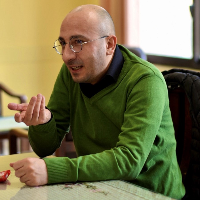Ethics Getting Problematic in Iranian Cinema: The Transition from the Text to the Social Context: A Case Study of the Movie «Separation»
Art is the most important sphere of everyday-life representation, and so as influenced by history and Results showed ethics attributed to characters such as Nader, Simin, and Termeh is consecutive-oriented. Although streaks of task-oriented and virtue-oriented ethos are also visible from them in some minutes of movie, ethics attributable to the character Razieh as representative of the lower-class is non-profit-oriented, task-oriented, and sharia-oriented. It is also necessary to mention that existentialist reading of the movie showed that in this film the issue of selection, responsibilities, election, and power and value worlds are problematic, and the issue of choosing between ethics and minor conditions raised by the position so that as the cases in terms of being in the tough stance of selecting moral choices were put in a terrible, frightening, anxiety-making, and responsibility-awarding situation. This position has also a tragic outcome for the character, and this would cause them to suffer anxiety and isolation. In the world of the text, the issue of morality is not polarity-building, but it observes the possibility or refusing of a moral life and even questioning the nature of morality in modern times. In the end, using the theory of cultural materialism, the issue of possibility of the cultural texts such as separation was analyzed.
-
"When he left": the narrative of the lives of abandoned women
Zohreh Bayati Komitaki *, , Sayed Ali Hashemian Far, Hamid Dehghani
Pazuhesname - ye Zanan, -
Narrating the Lived Experience of Family Counseling in the Perceptive World of Women
Rehane Batani Noushabadi, Behjat Yazdakhasi *, Ehsan Aghababai, Maryam Fatehizadeh
Journal of Social Sciences, -
Good Society in Imam Khomeini's Thought (Features, Obstacles, and Methods)
*, Ali Rabbani
Journal of Islam and Social Sciences, -
On "Door"Simmelian look on "Lovely Trash" and "Paternal House"
, Baharak Mahmoudi *
Journal of Cultural Studies Communication,



